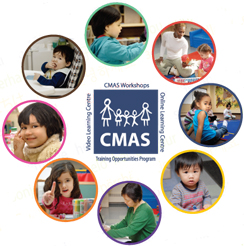
Professional development that’s available online… anytime…
- Study from anywhere!
- There are no fixed times; you study when you want, fitting it in around your work or family life.
With limited funding for professional development, these online tutorials, webinars and courses can fill in the learning gap.
If you have not received your username or password email online-learning@cmascanada.ca
Online Tutorial, Webinar and e-Course Descriptions
Scroll to online learning options in the area of:
- Building Quality in CNC
- Health and Safety in CNC
- Working with Newcomer Families
- CNC Administration
- Special Needs
Videos
We also have some videos that may be helpful.
Building Quality in CNC

3 Simple Visuals For Every CNC Program
Tutorial length: 8 minutes
Young children are naturally visual learners as they observe, imitate and learn to read body language. For newcomer children, visual cues can be even more important – especially when you don’t have a shared language!
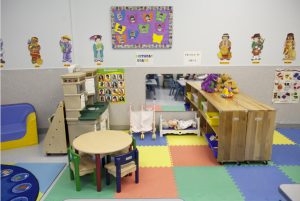
How Your Early Learning Environment Impacts Behaviour
Tutorial length: 10 minutes
 4 Tips for Building Confidence in Newcomer Children
4 Tips for Building Confidence in Newcomer Children
Tutorial length: 16 minutes
 5 Guiding Principles for the Care of Newcomer Children
5 Guiding Principles for the Care of Newcomer Children
Tutorial length: 30 minutes
 10 Tips for Difficult Conversations with Parents: The Basics
10 Tips for Difficult Conversations with Parents: The Basics
Tutorial length: 30 minutes
Sometimes, we need to have difficult conversations with parents about their child’s development, challenges or needs. Planning for these interactions can be stressful, but this 19-minute tutorial provides you with tools and strategies, common mistakes to avoid, and 10 tips for planning ahead and managing difficult conversations in an approachable and professional way. It also includes a facilitator guide and 10 questions for group discussion and personal reflection to use with your team, extend your learning and help you identify concrete strategies that you can use in your program. Let’s get started!
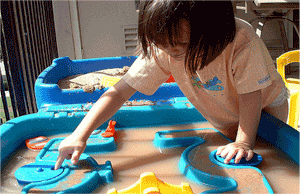
How to select toys for short term or mobile and programs
Tutorial length: 14 minutes
You may not know the number of children, their ages and needs until they arrive. And staff may have to bring toys to different locations, so they need to be easy to transport and store! How can you plan for so many variables? This quick-tip tutorial will help you plan for uncertainties and select the toys you need for a mobile or short term program. In it, you’ll find 7 key factors to consider, a printable list of toy suggestions, and ideas for developing your own mobile kits.

When Children’s Behaviour is Challenging
Tutorial length: 22 minutes
Sometimes a child’s behaviour challenges us and forces us to step outside our usual comfort zone. Find out what to do when children’s behaviour is challenging you, common mistakes to avoid, and 7 steps to take when behaviour is challenging in your program. We’ve also developed a Facilitator guide that includes 10 Questions for Group Discussion and Personal Reflection to use with your team, extend your learning and help you identify concrete strategies that you can use in your program. Let’s get started!
Health and Safety in CNC
Does your team know the 5 steps to follow if a child has a severe allergic reaction?
Tutorial length: 10 minutes
Anaphylaxis is a severe allergic reaction that can be life-threatening. Training, awareness and planning are essential to managing risks and keeping children safe. Train staff quickly and easily with this quick-tip-tutorial
 Child Abuse Prevention and Intervention
Child Abuse Prevention and Intervention
e-course length: 1 hour 15 minutes
In this online course, you will review key information and strategies, and participate in practical activities to help you feel more confident and knowledgeable about child abuse prevention and intervention.
For each topic, you will have a chance to practice various tasks to help you with your roles and responsibilities in the workplace when dealing with a child abuse concern. You will also have an opportunity to practice finding the information you need to determine the best actions to take.
The activities and examples in this course are real-life and are meant to help you take the information you have learned in your previous course and to apply it in the workplace. Download PDF | Go to Course

How do you make sure the toys in your program are safe?
Tutorial length: 10 minutes
You may believe that a toy is safe if it’s on a store shelf, but that’s not necessarily true. Canada has rigorous laws on toy safety, but there are still many variables that can actually make a toy hazardous! Toys can become unsafe due to wear and tear, how they are used, or because of recalls and changing standards. Learn how to make sure your toys are safe in this quick-tip tutorial.

Importance of Fire Drills
Tutorial length: 13 minutes
Planning, practice and training is the best way to keep children safe. Staff must know how to respond to a fire emergency – even if they are there on an infrequent basis. Learn about basic fire drill standards and practices for your CNC program in this quick-tip tutorial.

Managing Risk: Supervision of Children
Tutorial length: 12 minutes
Most serious occurrences and injuries are predictable and preventable, but when supervision strategies break down, children can be at risk. We know that children must be supervised at all times, but what does that actually mean? Managing Risk: Supervision of Children provides a list of common mistakes and risks to consider when developing or reviewing your policies and procedures, checklists, tools and strategies for keeping the children in your care safe. At the end of the tutorial, you’ll also find resources, references, a facilitator guide and added group discussion questions so that you can easily facilitate your own team training.
Working with Newcomer Families
 5 Guiding Principles for the Care of Newcomer Children
5 Guiding Principles for the Care of Newcomer Children
Tutorial length: 30 minutes
 10 Tips for Difficult Conversations with Parents: The Basics
10 Tips for Difficult Conversations with Parents: The Basics
Tutorial length: 30 minutes
Sometimes, we need to have difficult conversations with parents about their child’s development, challenges or needs. Planning for these interactions can be stressful, but this 19-minute tutorial provides you with tools and strategies, common mistakes to avoid, and 10 tips for planning ahead and managing difficult conversations in an approachable and professional way. It also includes a facilitator guide and 10 questions for group discussion and personal reflection to use with your team, extend your learning and help you identify concrete strategies that you can use in your program. Let’s get started!
 Child Abuse Prevention and Intervention
Child Abuse Prevention and Intervention
e-course length: 1 hour 15 minutes
In this online course, you will review key information and strategies, and participate in practical activities to help you feel more confident and knowledgeable about child abuse prevention and intervention.
For each topic, you will have a chance to practice various tasks to help you with your roles and responsibilities in the workplace when dealing with a child abuse concern. You will also have an opportunity to practice finding the information you need to determine the best actions to take.
The activities and examples in this course are real-life and are meant to help you take the information you have learned in your previous course and to apply it in the workplace. Download PDF | Go to Course
 Separation Anxiety and Culture Shock
Separation Anxiety and Culture Shock
e-course length: 68 minutes
The Separation Anxiety and Culture Shock online workshop will help you understand separation anxiety in immigrant and refugee families and the impact of culture shock on the separation process.
The course offers strategies to help you manage separations, as well as parent expectations. From creating a sample separation plan to navigating your way through a gradual separation scenario, you will put these strategies into practice.
By the end of this workshop, you should feel confident in your ability to smoothly and professionally support newcomer children and parents through the separation process. Download PDF | Go to Course

Understanding Children’s Settlement: The Basics
Tutorial length: 15 minutes
International research shows that young immigrant and refugee children experience settlement needs in five key areas. To build responsive programs for newcomer children, CNC staff need to understand these unique needs and how they can help. Understanding Children’s Settlement: The Basics is a 15-minute tutorial that describes each settlement need and strategies you can use in your program. It will also give you tips on how you can tell if a child is settling successfully! At the end of the tutorial, you’ll also find suggested resources, a facilitator guide and added group discussion questions so that you can easily facilitate your own team training. English version | French version
 Working with Newcomer Families
Working with Newcomer Families
e-course length: 69 minutes
The Working with Newcomer Families online workshop gives you the knowledge and tools to collaborate with and gain the trust of the families of the children in your care.
The course covers both the theory and practice behind topics that include family and child-centred care, diversity and bias, cross cultural child-rearing practices and communication, and building trusting relationships.
By the end of this workshop, you should feel confident in your ability to create positive, professional and trusting relationships with immigrant and refugee families that are based on mutual respect and recognition of the value of diversity. Download PDF | Go to Course
CNC Administration
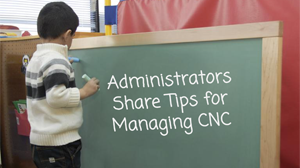
9 Tips for Managing CNC: Sharing Promising Practices: Helping you Manage CNC
Webinar length: 53 minutes
In this webinar, three experienced CNC administrators share tips for managing a successful team that includes both CNC and adult services! Special thanks to Chuck Dowdall from Kingston Literacy, Effat Ghassemi from Newcomer Centre of Peel, and Fitsum Getahun from Immigrant and Refugee Community Organizations of Manitoba for sharing their promising practices.
Once you have completed this webinar, we invite you to complete this evaluation, which will help with the development of future webinars. Watch the webinar...
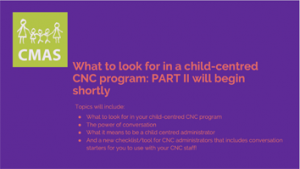
PART 2 – What to look for in a child-centred CNC program: Helping you Manage CNC Webinar
Webinar length: 56 minutes
In this webinar, presented by Ryerson/George Brown professor, Rachel Brophy, CNC Administrators have the opportunity to learn more about what to look for in their child-centred CNC program, the power of conversation, and what it means to be a child-centred administrator. There’s also a helpful tool for CNC administrators that includes an observation checklist and a list of conversation starters for discussions around CNC curriculum! Watch the webinar recording, download the ppt and What to look for in a child-centered program: A helpful tool for CNC Administrators now!

PART 1 – What to look for in a child-centred CNC program: Helping you Manage CNC
Webinar length: 56 minutes
In this webinar, presented by Ryerson/George Brown professor, Rachel Brophy, CNC Administrators have the opportunity to learn about child-centred care, and what to look for in their CNC program to ensure that newcomer children and parents are receiving the quality care and support they need. There’s also a helpful checklist for CNC administrators t! Once you have completed this webinar, we invite you to complete this evaluation, which will help with the development of future webinars. Watch the webinar...

The Importance of Early Identification for Newcomer Children with Special Needs–Helping you Manage CNC
Webinar length: 55 minutes
CNC programs are often one of the first points of contact for families who are new to Canada, and they can play an important role in getting support for newcomer children with special needs. In this webinar, presented by Sasha Delgado and Maria Velasquez, from Macaulay Child Development Centre, CNC Administrators will have the opportunity to learn about why early identification and support for newcomer children with special needs is so important, and discuss strategies for how SPOs can help better children with special needs and their families. Once you have completed this webinar, we invite you to complete this evaluation, which will help with the development of future webinars. Watch the webinar...
As promised, here is the report that the presenter agreed to share. For more information on well-child visits and schedules, please visit Caring for Kids.
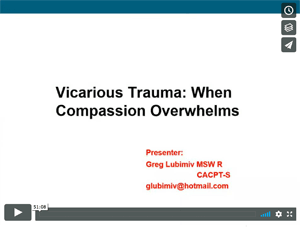
Vicarious Trauma: When Compassion Overwhelms
Helping you Manage CNC Webinar length: 51 minutes
Managers and organizations play a critical role in preventing and responding to vicarious trauma and burnout. Vicarious trauma, or compassion fatigue, results from witnessing or responding to the pain and suffering of people who we come into contact with. As a result, our ability to help becomes compromised and the helper is in danger of experiencing a trauma response. In this webinar recording for CNC administrators and SDRs, Greg Lubimiv, author of When Compassion Hurts: Burnout, Vicarious Trauma and Secondary Trauma in Prenatal and Early Childhood Service Providers describes; what vicarious trauma is and how it is different from burnout, risk factors and how to identify signs and symptoms of vicarious trauma, and preventive measures organizations and managers can take to provide a protective and supportive environment for their staff.
Once you have completed the webinar, we invite you to complete this evaluation, which will help with the development of future webinars

Managing Risk: Supervision of Children
Tutorial length: 12 minutes
Most serious occurrences and injuries are predictable and preventable, but when supervision strategies break down, children can be at risk. We know that children must be supervised at all times, but what does that actually mean? Managing Risk: Supervision of Children provides a list of common mistakes and risks to consider when developing or reviewing your policies and procedures, checklists, tools and strategies for keeping the children in your care safe. At the end of the tutorial, you’ll also find resources, references, a facilitator guide and added group discussion questions so that you can easily facilitate your own team training.
Special Needs

The Importance of Early Identification for Newcomer Children with Special Needs–Helping you Manage CNC
Webinar length: 55 minutes
CNC programs are often one of the first points of contact for families who are new to Canada, and they can play an important role in getting support for newcomer children with special needs. In this webinar, presented by Sasha Delgado and Maria Velasquez, from Macaulay Child Development Centre, CNC Administrators will have the opportunity to learn about why early identification and support for newcomer children with special needs is so important, and discuss strategies for how SPOs can help better children with special needs and their families. Once you have completed this webinar, we invite you to complete this evaluation, which will help with the development of future webinars. Watch the webinar...
As promised, here is the report that the presenter agreed to share. For more information on well-child visits and schedules, please visit Caring for Kids.

3 Simple Visuals For Every CNC Program
Tutorial length: 8 minutes
Young children are naturally visual learners as they observe, imitate and learn to read body language. For newcomer children, visual cues can be even more important – especially when you don’t have a shared language!
Additional Videos
- CMAS 2009 Conference Highlights
- Education Online – Highlights
- Block Play Workshop
- Bringing Children’s Stories to Life
- Welcoming Refugee Families
- Great and Sustainable First Impressions
- Great School Age Resources: Quick Tip Video
- Art Activities For All Learners
- Mentoring for Personal and Professional Growth
- Meeting the Distinctive Needs of Newcomer Children in Childminding Settings
- Terrific Toddlers
- 1 in 100: Bringing Epilepsy Out of the Shadows
- Care for Newcomer Children: A New Type of Child Care Support (Administrators)
- Care for Newcomer Children: A New Type of Child Care Support (CNC Staff)
- Loose Parts
- CMAS Podcasts: CNCR Changes Since the 2012 Conference Presented by Susan Hoo & Tricia Doyle
- Linguistically Appropriate Practice
- “The Change Train”

